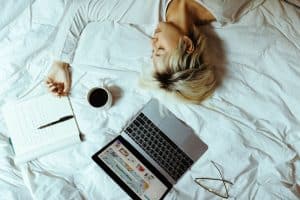
Caffeine blocks the effect of adenosine, a neurotransmitter in the central nervous system that causes fatigue when it is not received in sufficient amounts. Although caffeine blocks adenosine receptors in the brain, the body still produces adenosine. When coffee wears off, adenosine builds up again and attaches itself to the receptors, causing tiredness and sleepiness. Caffeine may cause drowsiness if a person is already habit-forming to coffee.
Caffeine blocks the effects of adenosine.
Coffee and other caffeinated beverages stimulate the body, but it also risks building tolerance. In the long run, drinking too much caffeine can lead to a buildup of adenosine receptors and reduced energy levels. As a result, coffee will not keep you as alert as it used to. Caffeine also decreases blood sugar levels, and overdose can make you feel tired.
Although the body rapidly absorbs caffeine, it has a short half-life. This is due to its rapid absorption and lack of effect on the body’s ability to make new adenosine molecules. After caffeine wears off, adenosine molecules can bind to the receptors and make you tired. The effects of caffeine are not permanent, but they can last between three and 10 hours.
Adenosine is a chemical found in the central nervous system that regulates sleep and wakefulness. It helps you fall asleep by inhibiting basal forebrain activity, making you feel sleepy. But caffeine inhibits adenosine from working in your brain, making it hard to quit abruptly. The effects of caffeine withdrawal include headaches and an increased need for sleep.
Its effects on sleep are not permanent, however. While coffee makes you alert and energized, its effects wear off quickly, and you may begin to feel tired throughout the day. Similarly, alcohol can also make you feel sleepy. Caffeine affects your sleep by blocking adenosine receptors. If you drink too much, you may begin to build a tolerance to caffeine and become more drowsy.
Caffeine works by blocking adenosine, produced by nerve cells in the brain. By inhibiting adenosine, caffeine causes blood vessels to narrow and reduce flow. Caffeine also affects the release of sugar into the bloodstream, making you tired. Caffeine is a neurotransmitter that affects mood and sleep pressure.
Caffeine is a diuretic.
 Many people wonder if caffeine is a diuretic. There is no hard and fast rule, but one study suggests that caffeine can dilute urine. Drinking coffee can increase your urination, but it is not a strong diuretic. During an 11-day study, 59 healthy adults were given caffeine capsules on some days but placebos on others. Researchers found no difference in excreted electrolytes or urine volume between the caffeine or placebo-diuretic groups. Caffeine is not a diuretic in small quantities, but it has diuretic effects in large doses.
Many people wonder if caffeine is a diuretic. There is no hard and fast rule, but one study suggests that caffeine can dilute urine. Drinking coffee can increase your urination, but it is not a strong diuretic. During an 11-day study, 59 healthy adults were given caffeine capsules on some days but placebos on others. Researchers found no difference in excreted electrolytes or urine volume between the caffeine or placebo-diuretic groups. Caffeine is not a diuretic in small quantities, but it has diuretic effects in large doses.
Caffeine is naturally found in cocoa beans, kola nuts, yerba mate, guarana, and guarana. However, coffee and tea are significant sources of caffeine consumption. While many people consider caffeine an essential dietary ingredient, health-conscious individuals should wonder if caffeine is a diuretic. Coffee and tea are the most common forms of caffeine, and many people drink anywhere between three to six cups each day. They use caffeine to stay alert, have more energy, and carry out daily tasks.
While caffeine is a diuretic, its effect is mild. The amount of caffeine a person consumes will determine how much they pee. It can also increase the frequency of bathroom trips, but this does not necessarily lead to dehydration. However, some people think caffeine is a diuretic because it makes them pee more, but this is not true. Caffeine consumption can increase fluid intake by up to 30%.
Coffee is the second most popular beverage in the world. Two separate studies investigated its diuretic effects. Both used pure caffeine tablets to assess the effects on urinary excretion. This isolated caffeine reduces the variability of the results, making it possible to generalize the findings to a larger population. One study found that the effects of coffee in mice were less than half of what people drink in coffee.
In addition to its diuretic effect, caffeine has other adverse effects. Some of these side effects include restlessness, anxiety, and jitters. In addition, caffeine can raise your blood pressure and cause a high heart rate. Drinking coffee can also lead to dehydration, so it is important to avoid caffeine before exercise. This way, you can increase your fluid intake and prevent dehydration. Besides, caffeine is an excellent source of antioxidants.
Caffeine can trigger a stress response.
According to research, drinking caffeine can trigger the stress response by boosting the secretion of the hormone cortisol. This hormone fuels the body’s fight-or-flight response and diverts bodily functions to the state of stress. This reaction causes blood pressure to rise and heart rate to increase, causing energy levels to soar. While this response is helpful for survival in the face of danger, too much caffeine can compromise our ability to cope with stress. Caffeine should be avoided during times of high stress.
The effects of caffeine depend on the individual. A cup of coffee can contain 200 milligrams of caffeine. A cup of tea contains about half that amount. However, caffeine can also cause anxiety and irritability. Caffeine is also known to hurt neurochemistry and lowers the levels of cofactors necessary for the synthesis of neurotransmitters. While this has positive benefits for our mental health, it is also important to remember that caffeine should be consumed in moderation.
In humans, caffeine increases cortisol levels and may increase the occurrence of stress at both high and low levels. While it does not develop tolerance, caffeine increases blood pressure and plasma norepinephrine. Research has shown that caffeine increases stress levels sporadically and regularly. The effects of caffeine are not limited to anxiety; it can also cause less efficient sleep and daytime sleepiness.
Although consuming moderate amounts of caffeine does not affect anxiety levels, it can exacerbate mental health problems. While it increases alertness and boosts mood, caffeine can aggravate anxiety and panic disorders. According to a 2008 study, moderate amounts of caffeine can trigger a stress response in the body. So if you’re prone to anxiety, coffee, tea, or soda can cause your anxiety symptoms. Caffeine can cause anxiety and even panic attacks.
Caffeine can become habit-forming.
Although it does not possess addictive properties, caffeine can be habit-forming. This is because caffeine alters chemical reactions in the brain. Regular caffeine users develop a tolerance to the wake-up effect and gradually need higher amounts to achieve the same alertness. Caffeine users will experience withdrawal symptoms and cravings when they suddenly stop drinking the substance. Caffeine users should limit their stimulant intake to one to two cups per day.
While most people associate drug addiction with highly harmful or illicit substances, the same is not valid for caffeine. Despite its social acceptance, caffeine can cause withdrawal symptoms when an individual does not take the drug regularly. Caffeine addicts may seek help from a treatment program that uses a cycling technique to reduce the frequency of the addictive cycle and avoid painful withdrawal symptoms. Caffeine addiction recovery can be highly challenging, but it is possible to reverse the process.
Regular consumption of caffeine changes the chemical and physical properties of the brain. The amount of adenosine receptors increases in the brain. As a result, the body becomes more tolerant of caffeine. It requires more Caffeine to produce the same effect. People with chronic caffeine intake can experience headaches, muscle pain, and temporary depression. The results of caffeine withdrawal are not immediate but may last for up to a week.




